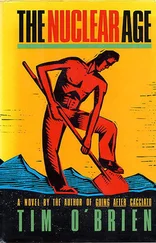—Bethany Kee (Associate Admissions Director, University of Minnesota)
He was not a fat child, not at all. He was husky. He had big bones. But sometimes I think his father made him feel—oh, made him feel—oh—maybe overweight. In sixth grade the boy wrote away for a diet he’d seen advertised in some silly magazine … His father teased him quite a lot. Constant teasing, you could say.
—Eleanor K. Wade
You know what I remember? I remember the flies. Millions of flies. That’s what I mostly remember. 5
—Richard Thinbill
Exhibit Three: Photograph of houseplant debris
Remains of six to eight plants (1 geranium, 1 begonia, 1 caladium, 1 philodendron, others unidentified)
Plant material largely decomposed
John loved his father a lot. I suppose that’s why the teasing hurt so bad … He tried to keep it secret—how much it hurt—but I could always tell … Oh, he loved that father of his. (What about me? I keep thinking that.) Things were hard for John. He was too young to know what alcoholism is.
—Eleanor K. Wade
Exhibit Four: Polling Data
July 3, 1986
Wade—58%
Durkee—31%
Undecided—11%
August 17, 1986
Wade—21%
Durkee—61%
Undecided—18% 6
Landslide isn’t the word. You saw the numbers? Three to one, four to one—a career-ender. Poor guy couldn’t get elected assistant fucking dogcatcher on a Sioux reservation … Must’ve asked a trillion times if there was anything that could hurt us, scum or anything. Man never said one single word. Zero. Which isn’t how you run a campaign … Did I betray him? Fuck no. Other way around. Worked like a bastard to get his sorry ass elected.
—Anthony L. (Tony) Carbo
Exhibit Five: Photographs (2) of boathouse (exterior), Lake of the Woods
Exhibit Six: Photographs (3) of “Wade cottage” (exterior), Lake of the Woods
I’ll bet she’s on a Greyhound bus somewhere. Married to that creep, that’s where I’d be. She liked buses.
—Bethany Kee (Associate Admissions Director, University of Minnesota)
I can’t discuss this. 7
—Patricia S. Hood (Sister of Kathleen Wade)
Engine trouble. That old beat-up Evinrude. Busted cord probably, or the plugs went bad. Give it time, she’ll walk right through that door over there. I bet she will . 8
—Ruth Rasmussen
I was working down at the Mini-Mart and they come in and I served them both coffee at the counter and then after a while they started having this argument. It went on for a while. She was mad. That’s all I know. 9
—Myra Shaw (Waitress)
A politician’s wife, so naturally you try extra hard. We did everything except empty out the goddamn lake. I’m not done yet. Every day goes by, I keep my eyes open. You never know. 10
—Arthur J. Lux (Sheriff, Lake of the Woods County)
The guy offed her. 11
—Vincent R. (Vinny) Pearson
That’s preposterous. They loved each other. John wouldn’t hurt a fly.
—Eleanor K. Wade
Fucking flies!
—Richard Thinbill
1.Interview, December 4, 1989, St. Paul, Minnesota.
2.Interview, July 12 and July 16, 1993, St. Paul, Minnesota.
3.Missing Persons File Declaration, DS Form 20, Office of the Sheriff, Lake of the Woods County, Baudette, Minnesota. Kathleen Wade was reported missing on the morning of September 20, 1986. The search lasted eighteen days, covered more than 800 square miles, and involved elements of the Minnesota State Highway Patrol, the Lake of the Woods County Sheriffs Department, the United States Border Patrol, the Royal Canadian Mounted Police (Lakes Division), and the Ontario Provincial Police.
4.Interview, September 21, 1991, Edina, Minnesota.
5.Interview, July 19, 1990, Fargo, North Dakota. Former PFC Thinbill, a Native American (Chippewa), served with John Wade as a member of the First Platoon, Company C, 1st Battalion, 20th Infantry, 11th Infantry Brigade, Task Force Barker, Americal Division, Republic of Vietnam.
6. Minneapolis Star-Tribune , The Minnesota Poll, July 3, 1986, and August 17, 1986, p. 1.
7.Interview, May 6, 1990, Minneapolis, Minnesota.
8.Interview, June 6, 1989, Angle Inlet, Minnesota.
9.Interview, June 10, 1993, Angle Inlet, Minnesota.
10.Interview, January 3, 1991, Baudette, Minnesota.
11.Interview, June 9, 1993, Angle Inlet, Minnesota.
When he was fourteen, John Wade lost his father. He was in the junior high gymnasium, shooting baskets, and after a time the teacher put his arm around John’s shoulder and said, “Take a shower now. Your mom’s here.”
What John felt that night, and for many nights afterward, was the desire to kill.
At the funeral he wanted to kill everybody who was crying and everybody who wasn’t. He wanted to take a hammer and crawl into the casket and kill his father for dying. But he was helpless. He didn’t know where to start.
In the weeks that followed, because he was young and full of grief, he tried to pretend that his father was not truly dead. He would talk to him in his imagination, carrying on whole conversations about baseball and school and girls. Late at night, in bed, he’d cradle his pillow and pretend it was his father, feeling the closeness. “Don’t be dead,” he’d say, and his father would wink and say, “Well, hey, keep talking,” and then for a long while they’d discuss the right way to hit a baseball, a good level swing, keeping your head steady and squaring up your shoulders and letting the bat do the job. It was pretending, but the pretending helped. And so when things got especially bad, John would sometimes invent elaborate stories about how he could’ve saved his father. He imagined all the things he could’ve done. He imagined putting his lips against his father’s mouth and blowing hard and making the heart come alive again; he imagined yelling in his father’s ear, begging him to please stop dying. Once or twice it almost worked. “Okay,” his father would say, “I’ll stop, I’ll stop,” but he never did.
In his heart, despite the daydreams, John could not fool himself. He knew the truth. At school, when the teachers told him how sorry they were that he had lost his father, he understood that lost was just another way of saying dead. But still the idea kept turning in his mind. He’d picture his father stumbling down a dark alley, lost, not dead at all. And then the pretending would start again. John would go back in his memory over all the places his father might be—under the bed or behind the bookcases in the living room—and in this way he would spend many hours looking for his father, opening closets, scanning the carpets and sidewalks and lawns as if in search of a lost nickel. Maybe in the garage, he’d think. Maybe under the cushions of the sofa. It was only a game, or a way of coping, but now and then he’d get lucky. Just by chance he’d glance down and suddenly spot his father in the grass behind the house. “Bingo,” his father would say, and John would feel a hinge swing open. He’d bend down and pick up his father and put him in his pocket and be careful never to lose him again.
Their seventh day at Lake of the Woods passed quietly. There was a telephone but it never rang. There were no newspapers, no reporters or telegrams. Inside the cottage, things had a fragile, hollowed-out quality, a suspended feeling, and over the morning hours a great liquid silence seemed to flow in from the woods and curl up around their bodies. They tried to ignore it; they were cautious with each other. When they spoke, which was not often, it was to maintain the pretense that they were in control of their own lives, that their problems were soluble, that in time the world would become a happier place. Though it required the exercise of tact and willpower, they tried to find comfort in the ordinary motions of life; they simulated their marriage, the old habits and routines. At the breakfast table, over coffee, Kathy jotted down a grocery list. “Caviar,” she said, and John Wade laughed and said, “Truffles, too,” and they exchanged smiles as proof of their courage and resolve. Often, though, the strain was almost impossible to bear. On one occasion, as she was washing the breakfast dishes, Kathy made a low sound in her throat and began to say something, just a word or two, then her eyes focused elsewhere, beyond him, beyond the walls of the cottage, and then after a time she looked down at the dishwater and did not look back again. It was an image that would not go away. Twenty-four hours later, when she was gone, John Wade would remember the enormous distance that had come into her face at that instant, a kind of travel, and he would find himself wondering where she had taken herself, and why, and by what means.
Читать дальше












